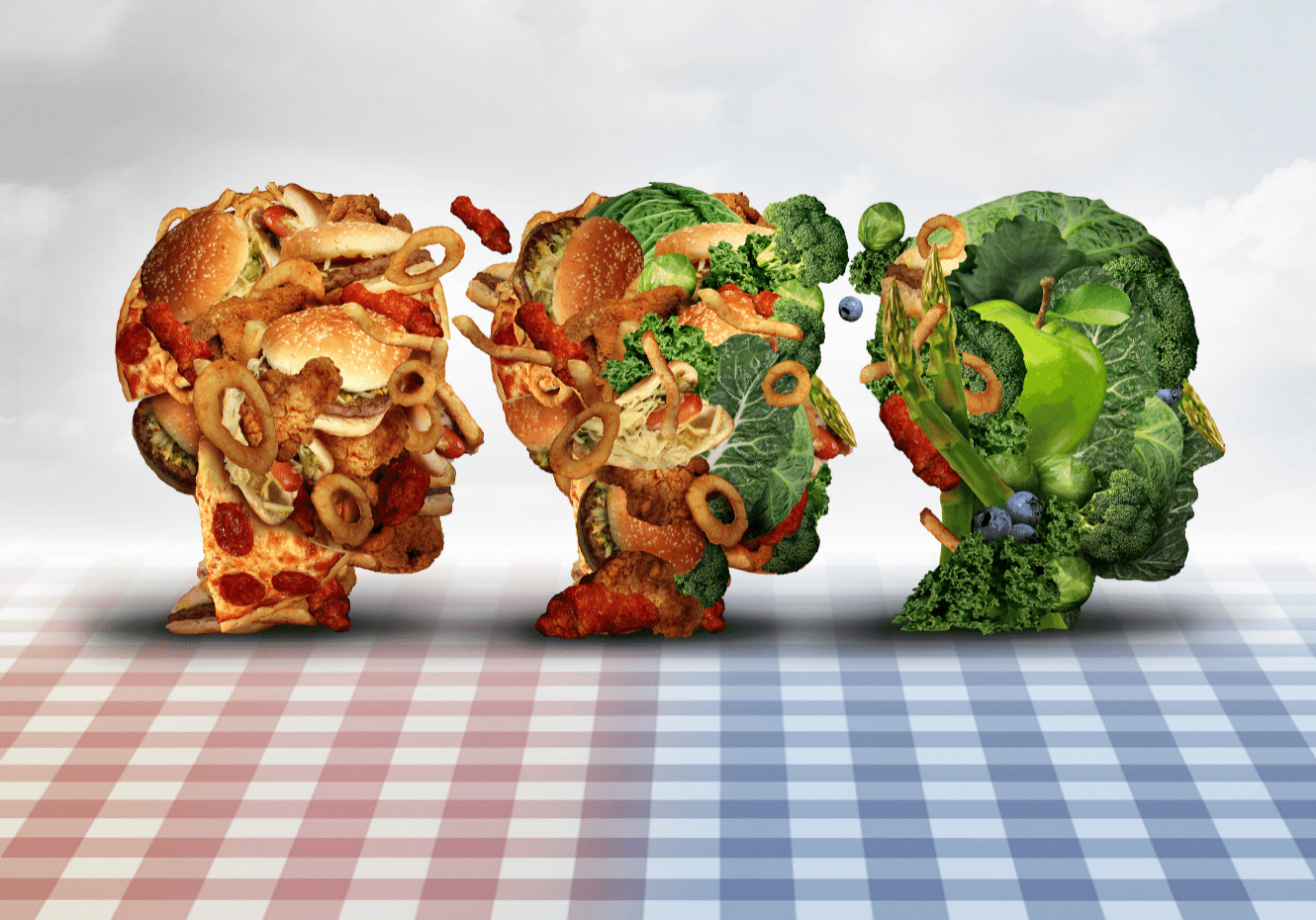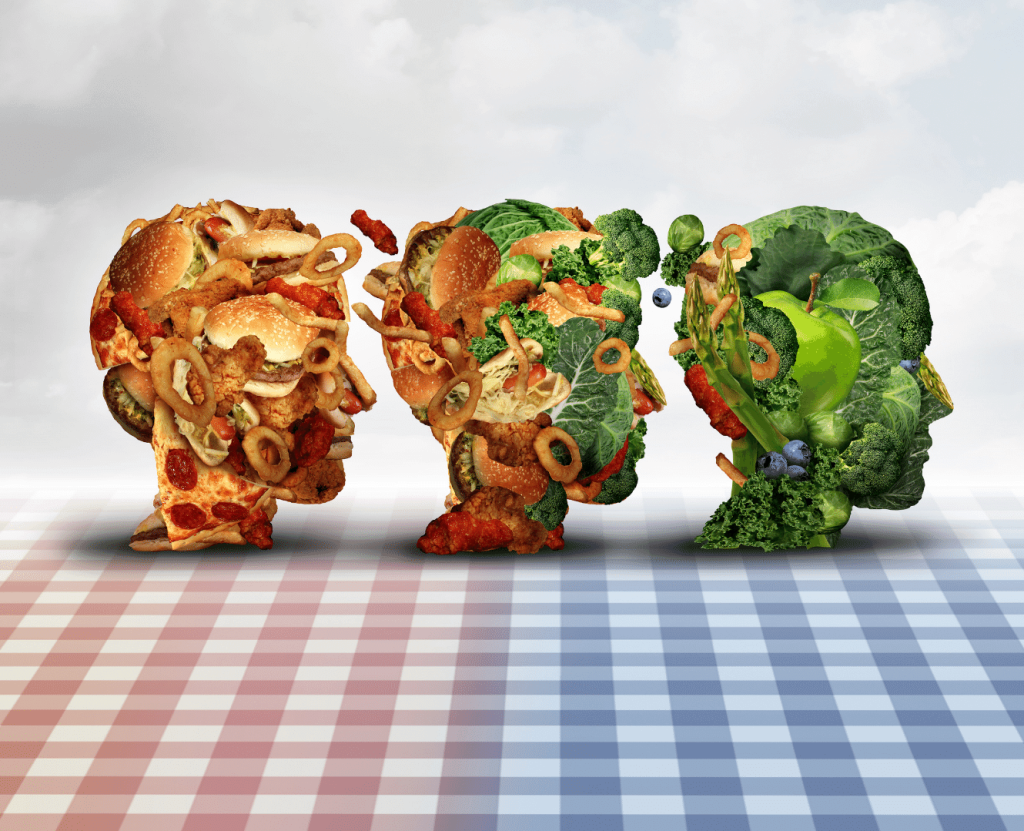Low fat vs Low carb – What’s better for weight loss?

If you are trying to lose weight, you’ve probably heard of various different diets that claim to help you shed pounds. Two of the most popular ones are low-carb and low-fat diets. But which one is better for both your health and your waistline?

Many people who struggled to lose weight and keep the weight off with low-fat diets in the 90s thrived on low-carb diets. This is when in-person and online tribes of low-carb devotees arise. Also, they start to demonize low-fat diets. Yet, some people thrive on higher-carb and low-fat diets, or not giving up all the seemingly evil foods.
In this article, we’ll dive into what research says about which diet is better both in terms of fat loss and cardiovascular health.

What Are Low-Carb And Low-Fat Diets Like?
If you’re cutting calories, it’s best to keep protein intake high to maintain satiety and also preserve muscle mass. So, a calorie deficit will come from cutting carbs or fats.
Low-Carbohydrate
While there isn’t an exact number that defines low-carbohydrates, research agrees that it’s a percentage of your caloric intake. Here’s the breakdown based on a 2,000-calorie diet:
- Very low carbohydrate (less than 10% carbohydrates): 20-50 grams daily
- Low carbohydrate (less than 26% carbohydrates): less than 130 grams daily
Naturally, when restricting carbohydrates, your fat and protein intake will increase. In a study comparing a low-carb diet to a low-fat diet, participants eating a 1,500-calorie diet consumed:
- Carbohydrates (12%): 45 grams
- Fat (59%): 99 grams
- Protein (28%): 105 grams
While this gives you an idea of the breakdown, the focus is on the amount of carbohydrates. The amount of fat and protein you consume varies based on the type of diet you may choose to follow, such as the Keto or Paleo diet. While the Keto diet is typically made up of 70% of calories from fat, the Paleo diet is about half as much at 35% fat.
Typically, when you consistently restrict your carbohydrates to below 40 grams per day, you reach a state of ketosis. This occurs because your body begins to break down fat for energy rather than carbohydrates.
Low-Fat
When eating a low-fat diet, the aim is to stay around 30% fat or lower. Here’s a breakdown of what that may look like for you based on how many calories you eat:
- 2,000 calories: 67 grams of fat
- 1,500 calories: 50 grams of fat
While fat intake remains low, your carbohydrate and protein intake will naturally increase based on your needs and preferences.
One important factor to pay attention to is when you are buying foods that are promoting themselves as low-fat. When food companies remove fats, they replace them with unhealthy fillers like refined carbohydrates. Some people may also struggle with low-fat foods being less satiating.
Regardless of the diet, ensuring that you get your macronutrients from whole foods as much as possible is essential. Now let’s turn to what studies tell us about both diets.

What Do Clinical Studies Say About Low-Carb vs. Low-Fat Diets For Fat Loss?
Many clinical studies compare the effects of low-carb and low-fat diets and get mixed results. Let’s take a closer look at what that means for fat loss.
In a study of 120 overweight individuals, researchers compared the effects of a low-carb keto diet with a low-fat, low-cholesterol, and reduced-calorie diet. After 24 weeks, all subjects lost more body fat than anything else. Subjects lost:
- Low-carb group: 7 pounds (3.3kg) total, 5.5 pounds (2.5 kg) of which was fat loss
- Low-fat group: 5 pounds (2.4 kg), almost four pounds (1.8 kg) of which was fat loss
In this study, those eating a low-carb diet experienced more weight and fat loss. There were, however, some limitations. The low-carbohydrate group also received dietary supplements during the clinical trial, and researchers could not determine how much those supplements may have influenced their weight loss.
Researchers also noted that while subjects successfully lost weight, they were unsure whether it was sustainable weight loss after 24 weeks. Additionally, only the low-fat group was calorie restricted, making it more difficult to compare the outcomes.
The DIETFITS Study
Another study examined the effects of these diets over a more extended period. A 12-month study of over 600 overweight adults compared the effects of low-carb vs. low-fat diets on:
- Weight loss
- Individual genotype patterns
- And insulin levels.
Genotype patterns refer to variations in specific genes that may affect your response to dietary changes. The idea is that based on your genes, a low-fat or low-carb diet may be more effective for weight loss.
Researchers also examined insulin levels in participants because previous studies suggest that your insulin levels may affect weight loss success on a low-fat or low-carbohydrate diet. For example, people with greater insulin resistance may experience more success with low-carbohydrate diets. This is because your body doesn’t have to produce as much insulin to process the lower carbohydrates in your diet.
The low-carb and low-fat groups experienced very similar outcomes, on average:
- Two percent body fat loss
- Four-centimeter reduction in waist circumference indicating loss of belly fat
- Overall weight loss of 12-13 pounds (5.5-6 kg)
Researchers also determined that neither genetics nor insulin affected participants’ weight loss.
This study has many strengths. It has a large sample size helping prevent false findings and an almost equal number of men and women. Rather than emphasizing calorie restriction, there was a strong emphasis on maintaining a wholesome and balanced diet by:
- Maximizing vegetable intake
- Minimizing the consumption of added sugars, refined flour, and trans fats
- Focusing on whole foods – minimally processed, nutrient-dense, and preferably prepared at home
By focusing on changing dietary and behavioral habits (such as increasing physical activity), the hope is that these health behaviors are long-lasting.
Researchers acknowledge that limitations also exist in the study. Participants’ diets were self-reported, which can limit the accuracy of results, especially in a study focused on the effects of a particular diet.
Additionally, because researchers did not randomly assign participants to dietary groups based on genotype or insulin levels, it’s difficult to draw a causal conclusion based on those factors. Researchers hope to explore the relationship further.

Meta-Analyses
After examining some individual studies, let’s look at a meta-analysis of many studies to help get a larger overall picture of which diet may be best for fat loss.
A meta-analysis included 23 studies of 2,788 subjects and compared the effects of low-fat and low-carb diets during six and 24 months. Overall, there were no significant differences between the two groups.
No matter the diet, subjects lost around 12 lbs (5.5kg) and about six cm around their waists, indicating the loss of belly fat. Researchers noted that weight loss seemed higher for those eating a low-carb diet in the shorter-term studies.
Another recent meta-analysis of 33 studies, including over 3,000 participants, also noted more weight loss with those on a low-carbohydrate diet. They did, however, notice another important trend. While those eating a low-carb diet experienced more weight loss overall in the first six months, by the time they reached 24 months, the effects of both diets were the same.
Overall, a limitation of these meta-analyses is that the definition of a low-carb diet for the purpose of research is not always consistent. It can vary from 20-60 grams of carbohydrates per day. On the other hand, a low-fat diet is generally more consistent at less than 30% of calories from fat.
Another possible limitation is in the exact content of participants’ diets. Only a few studies include details regarding the types of fats or carbohydrates consumed. Different types of carbohydrates and fats can change the impact of weight loss.
These results highlight the importance of finding the best diet for you based on individual factors. To help further consider the implications of these diets, let’s turn to how these diets may affect your overall health.
Is The Low-Carb Diet Or The Low-Fat Diet Healthier?
When it comes to weight and fat loss, there doesn’t seem to be a significant difference between the two diets. Both can help you lose weight. But what if we look into health factors?
Inflammatory Markers
When it comes to reducing inflammation, a low-carbohydrate diet may be the leader.
A study focusing on the effects of low-carb and low-fat diets on inflammatory markers included 40 overweight adults lasting 12 weeks. Both diets reduced markers of inflammation, but the low-carb diet improved inflammatory response more than the low-fat diet.
The reduction in inflammatory markers was particularly surprising to researchers because those on the low-carb diet also had higher levels of arachidonic acid. Arachidonic acid is a known contributor to inflammation.
Researchers think an increase in arachidonic acid on a low-carb diet is likely due to its preservation rather than production. When preserved, it’s not broken down into harmful compounds called oxy-lipids. This may be because people on a low-carb diet have less oxidative stress. Therefore, the body may protect and use arachidonic acid to benefit the way fats are processed and improve inflammatory response.
Cholesterol And Triglycerides
Both low-carb and low-fat diets impact lipid levels in the body, including cholesterol and triglycerides.
A meta-analysis of 28 studies, including 6,499 adults, explored the effects of both diets on lipid levels.
- The low-carb diet: Improved both HDL (high-density lipoprotein, the “good” cholesterol) levels and triglycerides
- The low-fat diet: Improved both LDL (low-density lipoprotein, the “bad cholesterol) and total cholesterol
It’s important to note that these results were true for the first 12 months of the diet. After 12 months, there were no significant differences between the lipid levels for those on the two diets.
Researchers note that while low-carb diets seem to be better at improving some blood lipid levels, high-fat diets may increase cholesterol levels long-term. Therefore, diet choices should be based on individual needs.
Check out this article to learn more about how your diet may affect your cholesterol levels.

Blood Pressure
The same meta-analysis examined the effects of both diets on blood pressure. There was no difference between the two diets on systolic blood pressure (the top number). A low-carb diet, however, decreased diastolic blood pressure (the bottom number) significantly more than a low-fat diet.
These results suggest that opting for a low-carbohydrate diet may be more beneficial for lowering diastolic blood pressure.
Blood Sugar Control
Both low-carb and low-fat diets seem to be beneficial for blood sugar control.
In a study of 88 adults with large amounts of belly fat, researchers explored the effectiveness of both diets on blood sugar and insulin levels. After six months, both diets significantly reduced both fasting blood glucose and insulin levels.
The meta-analysis of 23 studies exploring the effects of diet on metabolic risk factors supports the results above. Researchers found that both low-carb and low-fat diets effectively lowered insulin levels.
They did notice an interesting trend: Low-carb diets were more effective at reducing insulin levels in younger people than in older people.
Conclusion
If your goal is weight loss, research shows that either a low-carb or low-fat diet will be effective. This is especially true when you eat healthy, whole foods and fewer calories than you burn throughout the day.
A low-carb diet may be more beneficial for those who struggle with:
- Blood sugar control
- High blood pressure
- Healthy HDL cholesterol and triglyceride levels
- Inflammation
A low-fat diet, on the other hand, offers support for those who need to lower their:
- LDL cholesterol
- Total cholesterol
Remember, the studies we discussed generally only followed subjects for up to two years, and the results of any diet can change based on individual circumstances. For more individualized support, work with your healthcare practitioner or dietician to determine what works best for your body.
Overall, the best diet is one that is healthy and sustainable. The lead author of the DIETFITS study, Dr. Christopher Gardner, noted: “The people most successful in keeping their weight off changed their relationship to food.”
- Oh, R., Gilani B., Uppaluri, K.R. Low Carbohydrate Diet. [Updated 2023 Jan 10]. In: StatPearls [Internet]. Treasure Island (FL)
- Forsythe CE, Phinney SD, Fernandez ML, et al. Comparison of low fat and low carbohydrate diets on circulating fatty acid composition and markers of inflammation. Lipids. 2008;43(1):65-77. doi:10.1007/s11745-007-3132-7
- Bhandari P, Sapra A. Low Fat Diet. StatPearls Publishing; 2023.
- Yancy WS Jr, Olsen MK, Guyton JR, Bakst RP, Westman EC. A low-carbohydrate, ketogenic diet versus a low-fat diet to treat obesity and hyperlipidemia: A randomized, controlled trial. Ann Intern Med. 2004;140(10):769. doi:10.7326/0003-4819-140-10-200405180-00006
- Gardner CD, Trepanowski JF, Del Gobbo LC, et al. Effect of low-fat vs low-carbohydrate diet on 12-month weight loss in overweight adults and the association with genotype pattern or insulin secretion: The DIETFITS randomized clinical trial. JAMA. 2018;319(7):667. doi:10.1001/jama.2018.0245
- Hu T, Mills KT, Yao L, et al. Effects of low-carbohydrate diets versus low-fat diets on metabolic risk factors: a meta-analysis of randomized controlled clinical trials. Am J Epidemiol. 2012;176 Suppl 7(suppl_7):S44-54. doi:10.1093/aje/kws264
- Lei L, Huang J, Zhang L, Hong Y, Hui S, Yang J. Effects of low-carbohydrate diets versus low-fat diets on metabolic risk factors in overweight and obese adults: A meta-analysis of randomized controlled trials. Front Nutr. 2022;9:935234. doi:10.3389/fnut.2022.935234
- Chawla S, Tessarolo Silva F, Amaral Medeiros S, Mekary RA, Radenkovic D. The effect of low-fat and low-carbohydrate diets on weight loss and lipid levels: A systematic review and meta-analysis. Nutrients. 2020;12(12):3774. doi:10.3390/nu12123774
- Tay J, Brinkworth GD, Noakes M, Keogh J, Clifton PM. Metabolic effects of weight loss on a very-low-carbohydrate diet compared with an isocaloric high-carbohydrate diet in abdominally obese subjects. J Am Coll Cardiol. 2008;51(1):59-67. doi:10.1016/j.jacc.2007.08.050







I’ve ordered mag breakthru, in an effort to get off a big pharmacy drug that I’ve been on for sleep for too long. Have gotten my dose down to half.
Anything I can get to help me sleep and stay asleep im game to buy.
Use cbd gummies. Help alittle.
Thank Can’t wait to receive my order.
Hopefully, I’ll be sleeping well.
Hello Diana,
My name is Ann-Marie, and I am a Happy Health Concierge here at BiOptimizers!
We also have the Sleep Breakthrough product. You can view or order the product using the link below. https://bioptimizers.com/shop/products/sleep-breakthrough
Our Nootopia department has the Dream Optimizer spray
https://nootopia.com/dream-optimizer
If you have any other questions, please email us at [email protected]
Take care and have a nice day!
My very best regards,
Ann-Marie
Happy Health Concierge
BiOptimizers